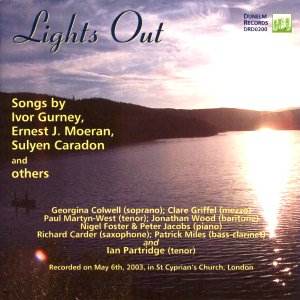The
Wesley Birthday Song seems rather preoccupied with
pomp not helped by the tremor in the baritone's voice and what
seems to be a rather oppressive microphone placement. After a
shaky start Griffel makes lovely melismatic hay with the
Purcell If Music be ...
Sulyen
Caradon, who has seven pieces on this CD, is Cornish. He studied
with Peter Wishart and Michael Bowles (the latter a friend of
Moeran who conducted the Dublin premiere of the cello concerto).
He is working on an opera on the life of King Bladud as well as
a Forest Symphony.
I
did not know any of Caradon's music so I was delighted to encounter
the subtle and poignantly coloured Clouds so beautifully
rendered by Griffel. The song has the ring of Michael Head
about it while The Dancer is full of Haydnesque piano activity
and a vocal line that coasts close to Finzi. There are a number
of solo piano pieces here. Caradon's Dorian Dirge (played
by Jacobs) is rather tough by comparison with the Caradon songs
and is relieved hardly at all by the ragtime colour that sometimes
seeps to the surface. Paul Martyn-West is entirely admirable and
is well represented by Lelant which possesses the same
heartland occupied by Clouds. The SATB song Dawn sets
de la Mare and works very well - smooth and gentle. O lovely
England is another SATB song though it is rather turgid -
like a hymn but without life or lift. The setting of Lascelles
Abercrombie's poem Margaret's Song might almost be by Goossens
or Van Dieren.
Alison
Edgar has the full instrumental complement. It is a complete
contrast with its neighbours. The 'usual' setting (Boughton and
Finzi) of Hardy's Lyonesse is quick and eager. This is
more of a reflective story telling without tension.
Ian
Partridge's voice has darkened by a shade over the years but
in this company he stands high for his calculated but pliant enunciation,
musical intuition and absolute tonal steadiness. This Gurney
group includes what is perhaps his best reading of the Salley
Gardens. Only in the enchanted All night under the moon
do the years seem to be telling. He is on top form in the
delicious Nine of the Clock relishing every syllable and
the smiling colour of the words 'sleepy starey Mary climbs down'.
I
am sorry but I am not at all taken with the voice of Jonathan
Wood. He suffers from tremulous note production and seems on the
day of recording at least to have trouble and finds awkward Gurney's
long demanding lines in the cycle Lights Out. But for this
you might liken his voice to that of John Shirley-Quirk.
Griffel's
three Moeran songs are equally well done - the watery Rahoon
with its raindrop piano figuration works extremely well as does
the lissom soliloquy of Loveliest of Trees showing that
Gurney and Ireland cannot have the field entirely to themselves.
The Seumus O'Sullivan Songs are amongst Moeran's most subtle
works. Certainly they are more elusive than the Housman and Shakespeare
cycle. They have the quality of Poulenc and are well sung by Paul
Martyn-West. It is well past time that someone recorded a complete
edition of the Moeran songs.
Georgina
Colwell has been a faithful friend to British song for upwards
of 20 years and there have been several CD recitals. She neatly
catches the seriousness and the humour of Whitton's Little
Vagabond to words by Blake. Shur's The Smile is
another reflective and subtle essay considering the variety of
smiles. The composer's decision to repeat certain verses works
very well. Rodgers' setting of The Acacia Tree by
Kathleen Raine is softly rippling and rhapsodic - rather like
late Poulenc I thought and the spoken words at the end of the
song work well.
The
disc is extremely well presented. The design is good. Notes are
fine and all the words are printed. I hope that there will be
more of these productions.
Rob
Barnett
see
also review by Jonathan
Woolf


